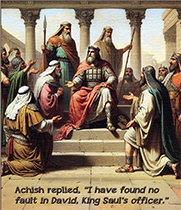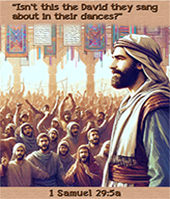1 Samuel 29:1–11 . . . Bible Study Summary with Videos and Questions
“The Man in the Middle”
As Saul reached the depth of his fortunes, David thus far attained the height of his popularity. This chapter resumes the story that ended at 28:2, though some time later. The writer appears to have incorporated into chapter 29 his narrative to highlight the contrasts between Saul and David in chapters 27–31, as follows.
We sometimes receive help from unexpected places. That was the case with David chapter 29 where he managed to get himself into a real jam. After being delivered from the hand of Saul on numerous occasions, he became weary of living like a fugitive. In a moment of despair, he reasoned that his only hope was to flee from Saul into the land of the Philistines. He was convinced that, once Saul learned where he was, he'd give up his pursuit. David and his 600 men, accompanied by their wives and children, found refuge in the land of the Philistines. David persuaded Achish, the Philistine king, to allow them to leave Gath and settle in the more remote town of Ziklag. From that base of operations, David staged raids against Israel's enemies. In each case, he deceived Achish by telling him that he'd instead raided another Israelite village or city nearby. To be sure that no one would be able to inform Achish of what had really happened, David intentionally killed everyone, leaving no survivors. He seems to have shared some of the spoils of war with King Achish (see 27:9), while also taking a share (at least on one occasion) to his Israelite brethren (30:26–31), the very people Achish thought David was killing off. In short, David was playing both ends against the middle.
David seems to have gotten away with his deception. Suddenly things took an unexpected turn, and David appeared to be caught in that "middle." King Achish informed David that the Philistine commanders had joined forces to stage a massive attack against Israel. He then told David that he and his 600 men would have the honor of fighting with and for him. David unnerved us readers of chapter 28 by assuring Achish that he'd fight valiantly for the Philistines. He promised to show Achish his full capabilities by going into battle with him. Achish responded to David’s assurances by offering him what he believed to be a great reward for faithful service: a lifetime job as Achish's personal bodyguard. Who'd have ever imagined David, once King Saul’s armor bearer, would be appointed the bodyguard of a Philistine king? The author leaves us in shock at this turn of events, when he turned attention in our last discussion to King Saul and the account of his visit with the medium of Endor. [All of that account can be found in last week's summary of 28:1–25.]
[Note: Click the link to This Week’s Passage near the bottom of this page to read today’s Scripture.]
The Philistine Commanders’ Fear of David (29:1–5)
Here in chapter 29, we come upon a terrified, panic-stricken King Saul. All through his gut-wrenching experiences at Endor, our minds have, more than likely, continually strayed back to David, who'd gotten himself into a most precarious situation. For a brief moment in time, he found himself caught in the middle with no apparent way out. It's at this point in time that help comes to him from a very unlikely source: four or five Philistine commanders who are probably kings of principal Philistine cities.
Achish Sends David Back to Ziklag
29 1The Philistines gathered all their forces at Aphek, and Israel camped by the spring in Jezreel. 2As the Philistine rulers marched with their units of hundreds and thousands, David and his men were marching at the rear with Achish.3The commanders of the Philistines asked, “What about these Hebrews?”
Achish replied, “Is this not David, who was an officer of Saul king of Israel? He has already been with me for over a year, and from the day he left Saul until now, I have found no fault in him” (1 Sam. 29:1–3).
The Philistines and David had prepared for battle against the Israelites. However, some of Achish's astute men didn't believe that David was on their side. To appease his men, Achish told David that he and his men weren't allowed to fight in the battle against the Israelites. Let's see how this turned out for David, "the man in the middle."
We learn in v. 1 that the commanders of Philistine city-states mustered their troops, marching north to the town of Aphek. It's interesting that the first place (in 1 Samuel) the Philistines mustered their troops for battle against the Israelites was at Aphek (4:1), and that the last place they did so was also at Aphek. This indicates that Israel hadn't subdued her enemy neighbor effectively during Saul's reign, as a result of his failure to lead.
Aphek stood near Philistia's northern border with Israel. The Philistine commanders were on their way to the Jezreel Valley to battle King Saul. David and his 600 mercenaries were bringing up the rear in the Philistine procession when the Philistine commanders noticed him and his men and asked each other why Hebrew soldiers were accompanying them since they were going to war against the Israelites. Achish, whom David had deceived into thinking that he was no longer loyal to Saul, came to his defense. Incidentally, David had lived in Philistia now for almost 16 months (cf. 27:7).
4But the Philistine commanders were angry with Achish and said, “Send the man back, that he may return to the place you assigned him. He must not go with us into battle, or he will turn against us during the fighting. How better could he regain his master’s favor than by taking the heads of our own men? 5Isn’t this the David they sang about in their dances:
“‘Saul has slain his thousands, and David his tens of thousands’?” (1 Sam. 29:4–5)
Troops were passing by their commanders by hundreds and thousands. Philistine commanders were shocked and angered by what they saw; they couldn't believe how naive King Achish of Gath was. They realized that David would probably turn against them in the upcoming battle to regain acceptance with his commander, King Saul. They used the same phrase that Achish had used to defend David, "Is this not David?" to impress on their gullible comrade what a danger David posed to them. He'd had not only slain many of Israel's enemies, including numerous Philistines, but he also enjoyed solidarity with Saul in the minds of all the people, which the song they quoted assumed.
His faith-filled victory over Goliath seemed like a distant memory for a backslidden David, but the Philistines remembered it well! The song of David's victory had come back to haunt him. Achish defended David and his loyal record, but the other Philistine leaders would have none of that. After all, with 600 men, David had the capacity to do significant damage behind Philistine lines, once the battle began. The generals weren't gonna be fooled.
Next, Achish faced the delicate task of explaining the situation to David without offending him. David appeared hurt but was inwardly relieved. So in the morning, the Philistine armies advanced toward the Jezreel Valley, while David and his men began the long trek back to Ziklag, far south in the Negev desert. Somehow, the LORD had helped David out of the middle of yet another ticklish situation!
Note that the “rear guard” of the entire Philistine army had been made up of none other than David and his men. Remember that King Achish “honored” David by making him his lifetime bodyguard. David and his soldiers were at the back of the entire Philistine army, which was a most crucial position; if at all possible, the opposing army would attempt to flank their enemy, attacking them from the front and behind. Those stationed at the back were usually the finest, bravest, and most highly skilled warriors. David and his men were given that hearty honor. What Achish regarded as an “honor” was perceived as a “horror” to the other Philistine commanders.
While we're not told what David was thinking or planning to do there, we're able to overhear the exchange between Achish and his commander colleagues at their top-level military summit. The commanders were livid; they couldn't imagine how Achish could have been so naive as to take David into battle with them, moreover to position him in a very strategic location. Unhappy with the situation, they wasted no time calling Achish to account for his folly, possibly asking him, What in the world are David and his 600 warriors — these Hebrews — doing in our Philistine army?
The Philistine commanders didn't give Achish a choice. They instructed Achish to send David home, back to Ziklag; he wouldn't be permitted to go to battle with them; perhaps more accurately, they wouldn't go into a battle with David. If Achish wanted to continue to offer David asylum in Ziklag, they probably thought, Good enough. That place is so remote that David could do little harm there. Send him back to Ziklag, Achish, cause he definitely won't be going to war with our Philistine army. And that's final!
David’s “One on One” with Achish (vv. 6–11)
Having read vv. 6–11, we see that David told Achish that he didn't want to be a burden to him so he asked for a place where he, his men, and their families could live. The king gave him the city of Ziklag. By skillful deception, David had convinced Achish that he and his men had raided Israelite towns, thus apparently furthering Philistine interests.
Looking at v. 6, Achish had the unpleasant task of disappointing David, telling him he must go home. He did so, surprisingly using language inappropriate for a true pagan: “As surely as the LORD lives, . . .” This wasn't the pagan term for “gods,” but the Hebrew term Yahweh, for the one true God, the God of Israel. Later on in v. 9, this Philistine king tells David that he was “as pleasing as an angel of God.” Strange phrasings, indeed; these weren't words that came from David but from Achish. Perhaps he carefully chose words that David’s faith had reflected on him. He was completely taken in by David; the immensity of David’s deception is evident in the words of praise of this pagan king. He not only flattered David, he apologized to him.
In v. 9b, when the Philistine commanders said, "He must not go up with us into battle," David might have considered possibly fighting with the Philistines against Israel, but God wouldn't permit him to do that. Although David's heart was in a bad place, God hadn't abandoned him! We should praise God for those times when he's kept us from sinning as bad as we were prepared to sin. Thankfully, David and his men left in the morning to return to Ziklag.
Early that morning, the Philistine warriors arose to initiate their battle campaign. The Philistines set out for Jezreel, where the Israelites were encamped, while David and his troops headed back for Ziklag. David had been saved by an angry reaction of a few Philistine commanders who overruled the plans of King Achish. We'll see how the battle goes in next week's summary discussion.
Closing Considerations
This chapter includes an encouraging revelation of how God takes care of his own when they're under extreme stress and not entirely obedient. David had come close to running out of ideas about how to preserve his life (cf. 27:1). He'd apparently received no special guidance from God in answer to prayer. The name of God doesn't appear in chapters 27 or 29, except in Achish's references to God. That suggests that God's guidance was scarce while David was in Philistine territory. David had even resorted to deception to protect himself (cf. 27:10–12; 29:8).
Seeing in v. 11 that “David and his men got up early in the morning to go back to the land of the Philistines,” it’s evident that the Holy Spirit can make things clear to us. All that happened in this chapter should have awakened David; he should have heard God speaking to him often, but he didn't. Instead, he went "back to the land of the Philistines." What was needed to bring David around? Because God loved David, the Lord would respond accordingly.
Nonetheless, God continued to guard his anointed servant, even in a foreign land. He convinced Achish of David's loyalty, which yielded a measure of protection for David. He also convinced the other Philistine commanders of David's threat to them, which resulted in their sending him [safely] far from the battlefield.
† Summary of 1 Samuel 29:1–11
This passage recounts a tense episode as the Philistine armies prepare to battle Israel, bringing David — who has been living in Philistine territory — into a crisis of loyalty and identity. The Philistine leaders gather at Aphek, with their troops arrayed, while the Israelites camp near Jezreel (29:1). David and his men are with Achish at the rear of the Philistine army (v. 2).
However, the Philistine commanders, suspicious of David’s loyalty, object strongly to his presence. They fear that, in the heat of battle, David might turn against them to regain Saul’s favor (vv. 3–4). Despite Achish’s personal trust in David, he yields to their demands and tells David that he and his men must leave (vv. 5–7).
David protests his innocence, asking what wrong he has done to be sent away, but Achish insists David has done nothing wrong in his eyes — yet the other commanders won’t allow him to fight (vv. 8–9). Achish urges David to leave early in the morning to avoid trouble with the Philistine leaders (v. 10).
Obediently, David and his men depart that very morning, returning to the land of the Philistines. The Philistines, meanwhile, march on to Jezreel to prepare for battle against Israel (v. 11).
Key points with verse references:
• The Philistines assemble their armies; David and his men are in the ranks with Achish at Aphek (vv. 1–2).
• Philistine commanders object to David’s presence, fearing he might betray them in battle (vv. 3–4).
• Achish, though convinced of David’s loyalty, tells him he must not join the fight because of the other leaders’ concerns (vv. 5–7).
• David protests, but Achish explains the situation and asks David to depart peacefully (vv. 8–10).
• David and his men leave early in the morning, returning to Ziklag, while the Philistines march to Jezreel for the battle with Israel (v. 11).
This passage quietly affirms God’s faithfulness — delivering David from an impossible moral dilemma — and sets the stage for the dramatic events to come.
This Week's Passage
1 Samuel 29:1–11
New International Version (NIV) [View it in a different version by clicking here; also listen to chapter 29 narrated by Max McLean.]
† Summary Video: “The First Book of Samuel”
† Watch this introductory video clip created by BibleProject on bibleproject.com.
- Q. 1 Have you recently been under extreme stress and not entirely obedient to God? If God has helped you, what did you allow him to do for you?
- Q. 2 Assuming that you've found yourself in "the middle of a challenging situation," how did you successfully pull yourself out of it?




